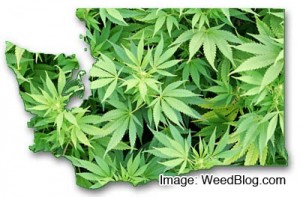by Lin McNulty

As Washington state legalizes possession of a small portion of pot, is today the beginning of the end of nationwide marijuana prohibition?
It’s seemingly simple enough: During last month’s election, Washington voters approved Initiative 502 (55% to 45%), which legalizes the possession of marijuana for adults over the age of 21.
Initiative 502 defines and distinguishes marijuana from other parts of the cannabis plant, legalizes small amounts of marijuana-related products for most adults, taxes them, and designates the revenue for healthcare and substance-abuse prevention and education.
Effective today (December 6, 2012), it is legal for an adult over the age of 21 to possess up to one ounce of useable marijuana, 16 ounces of marijuana-infused product in solid form (such as baked goods), or 72 ounces of marijuana-infused product in liquid form (such as oil).
Then, the matter gets more complicated: Although it is legal to possess pot in the State of Washington, it is not legal to purchase or grow the product. Possession by anyone younger than 21, possession of larger amounts, and the growing of unlicensed or unregulated marijuana remains illegal under state law. Personal “grows” in one’s own home, except for medical cannabis as regulated under RCW 69.51A, will remain illegal. Having it is legal; obtaining it is not. Hmmmm…
Initiative 502 will implement over a period of a year or more. Although legal possession and DUI limits go into effect on December 6, 2012, the state has until December 1, 2013, to establish other key rules, including trying to figure out how the Washington Liquor Control Board is going to regulate production and sales. With no precedent for state regulation anywhere in the world, Washington State is on the cutting edge of unfamiliar territory. Until the State establishes rules—and licenses are issued—retail sales to the general public are not allowed.
And there’s a further complication with the Federal Controlled Substance law wherein Cannabis is still classified as a Schedule I Controlled Substance and is subject to federal prosecution under the doctrine of dual sovereignty. How does this affect legal possessors in San Juan County? Many are asking this question locally, since the Initiative passed in the islands with a 68 percent favorable vote—highest percentage in the state.
Sheriff Rob Nou has implemented new guidelines for his deputies with updated training provided by the San Juan County Prosecutor, as well as the Washington State Law Enforcement Training Commission. Both Sheriff Nou and Prosecutor Randy Gaylord indicate that their departments are mindful of the public’s vote and intend to honor and follow it to see this through. Gaylord states that his department “will be involved on any efforts on the State level to make the entire plan work out.”
And both the Prosecutor and Sheriff acknowledge it is a work in progress. It has not even been codified yet by the Legislative Code Reviser. Because this was enacted by Initiative, Legislative approval is not necessary. In fact, the Legislature cannot touch it for two sessions. No revision of County Ordinance was necessary, either, as it is the RCW (Revised Code of Washington) which governs criminal law.
San Juan County normally prosecutes perhaps a dozen cases per year of possession with intent to deliver. Effective November 7, any pending cases for up to an ounce of marijuana were discontinued in anticipation of the law taking effect. It is typical for marijuana possession to be a companion charge, a violator having been found in possession during investigation of a separate offense.
Sheriff Nou opined that it’s very clear this initiative was marketed as a half-truth. “Read the measure,” he says. “The barn door is not wide open.”
The law creates a new infraction for using weed in public. “The best analogy,” Gaylord explains, “is it will be the same as alcohol laws. The law will provide for private, recreational use. The general public should not smell or see weed when in public places—just as it is an infraction to drink in public.”
Marijuana consumption will be subject to DUI laws, as well. Along with observation by law enforcement and additional evidence, a blood test showing 5 nanograms of THC (the principal psychoactive constituent of the cannabis plant) per mililiter of blood can be used as corroborative evidence of DUI.
Gaylord further noted that, because of the Federal prohibition, Border Patrol Agents, Customs Agents, and/or the Coast Guard may still charge a violator with possession of one ounce or less. The County, however, when working with any of these agencies, will treat any reference to pot in accordance with State law rather than Federal law.
The U.S. Attorney’s Office in Seattle released the following statement on Wednesday, reiterating their mandate from Congress to enforce the Federal law as it stands. Any change nationally will have to come from our legislative branch.
The Department of Justice is reviewing the legalization initiatives recently passed in Colorado and Washington State. The Department’s responsibility to enforce the Controlled Substances Act remains unchanged. Neither States nor the Executive branch can nullify a statute passed by Congress. In enacting the Controlled Substances Act, Congress determined that marijuana is a Schedule I controlled substance. Regardless of any changes in state law, including the change that will go into effect on December 6th in Washington State, growing, selling or possessing any amount of marijuana remains illegal under federal law. Members of the public are also advised to remember that it remains against federal law to bring any amount of marijuana onto federal property, including all federal buildings, national parks and forests, military installations, and courthouses.
I-502 is most definitely a work in progress. Make your choices wisely.
The full text of the 65-page Initiative from the Secretary of State is available for download HERE.
**If you are reading theOrcasonian for free, thank your fellow islanders. If you would like to support theOrcasonian CLICK HERE to set your modestly-priced, voluntary subscription. Otherwise, no worries; we’re happy to share with you.**







